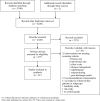Efficacy of Hospital at Home in Patients with Heart Failure: A Systematic Review and Meta-Analysis
- PMID: 26052944
- PMCID: PMC4460137
- DOI: 10.1371/journal.pone.0129282
Efficacy of Hospital at Home in Patients with Heart Failure: A Systematic Review and Meta-Analysis
Abstract
Background: Heart failure (HF) is the commonest cause of hospitalization in older adults. Compared to routine hospitalization (RH), hospital at home (HaH)--substitutive hospital-level care in the patient's home--improves outcomes and reduces costs in patients with general medical conditions. The efficacy of HaH in HF is unknown.
Methods and results: We searched MEDLINE, Embase, CINAHL, and CENTRAL, for publications from January 1990 to October 2014. We included prospective studies comparing substitutive models of hospitalization to RH in HF. At least 2 reviewers independently selected studies, abstracted data, and assessed quality. We meta-analyzed results from 3 RCTs (n = 203) and narratively synthesized results from 3 observational studies (n = 329). Study quality was modest. In RCTs, HaH increased time to first readmission (mean difference (MD) 14.13 days [95% CI 10.36 to 17.91]), and improved health-related quality of life (HrQOL) at both, 6 months (standardized MD (SMD) -0.31 [-0.45 to -0.18]) and 12 months (SMD -0.17 [-0.31 to -0.02]). In RCTs, HaH demonstrated a trend to decreased readmissions (risk ratio (RR) 0.68 [0.42 to 1.09]), and had no effect on all-cause mortality (RR 0.94 [0.67 to 1.32]). HaH decreased costs of index hospitalization in all RCTs. HaH reduced readmissions and emergency department visits per patient in all 3 observational studies.
Conclusions: In the context of a limited number of modest-quality studies, HaH appears to increase time to readmission, reduce index costs, and improve HrQOL among patients requiring hospital-level care for HF. Larger RCTs are necessary to assess the effect of HaH on readmissions, mortality, and long-term costs.
Conflict of interest statement
Figures




References
-
- Nieminen MS, Harjola VP. Definition and epidemiology of acute heart failure syndromes. Am J Cardiol. 2005;96:5G–10G. - PubMed
-
- Rodriguez-Artalejo F, Guallar-Castillon P, Pascual CR, Otero CM, Montes AO, Garcia AN, et al. Health-related quality of life as a predictor of hospital readmission and death among patients with heart failure. Arch Intern Med. 2005;165:1274–9. - PubMed
Publication types
MeSH terms
LinkOut - more resources
Full Text Sources
Other Literature Sources
Medical
Research Materials
Miscellaneous

